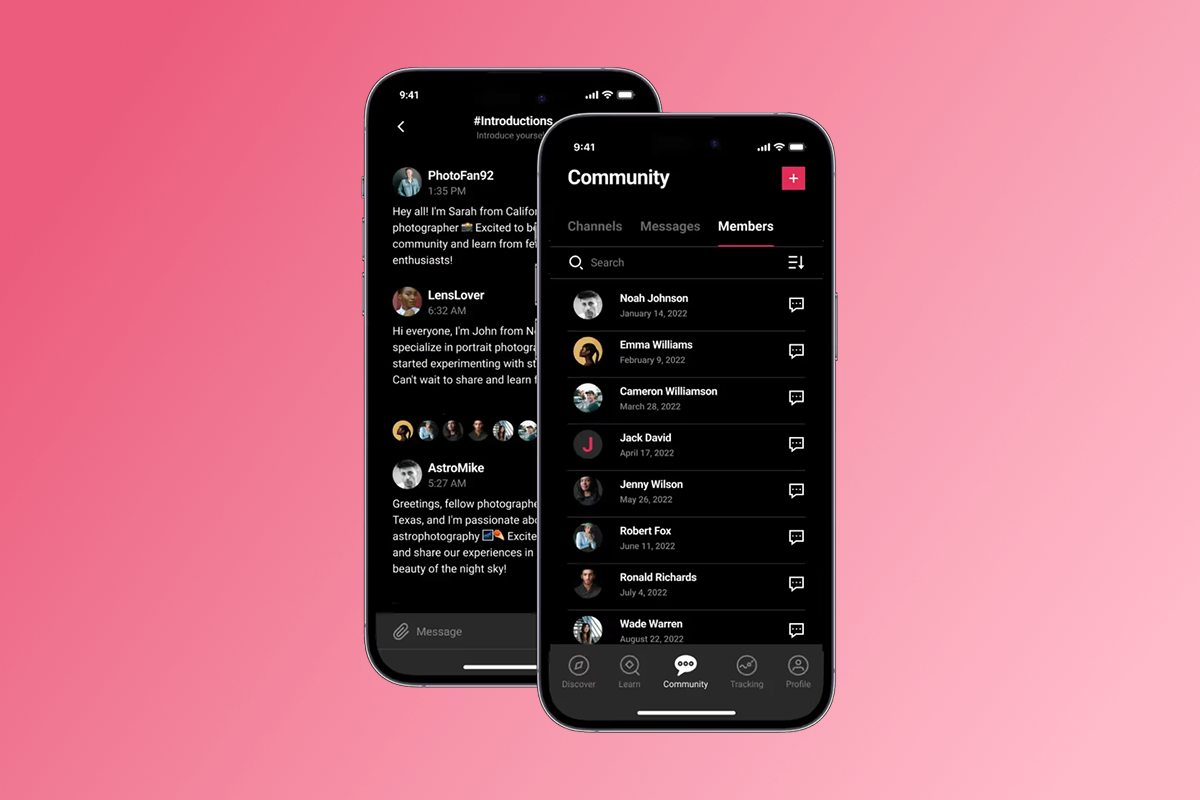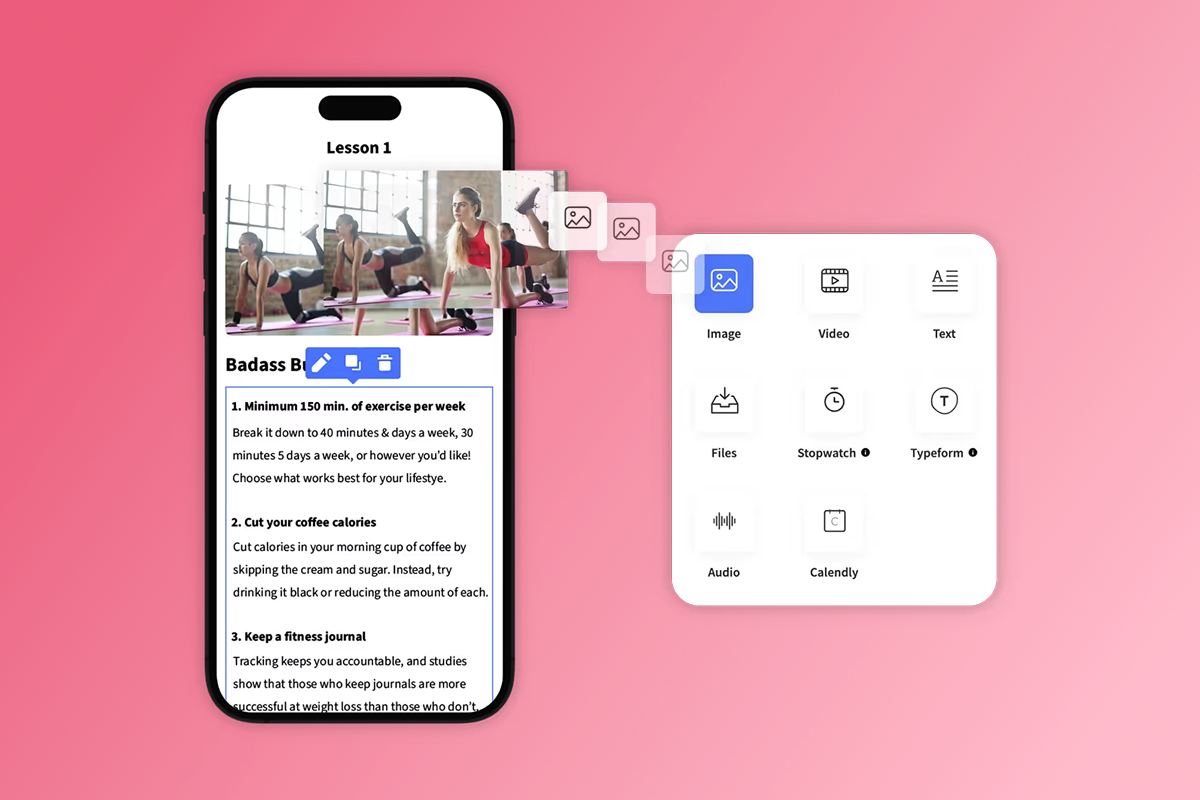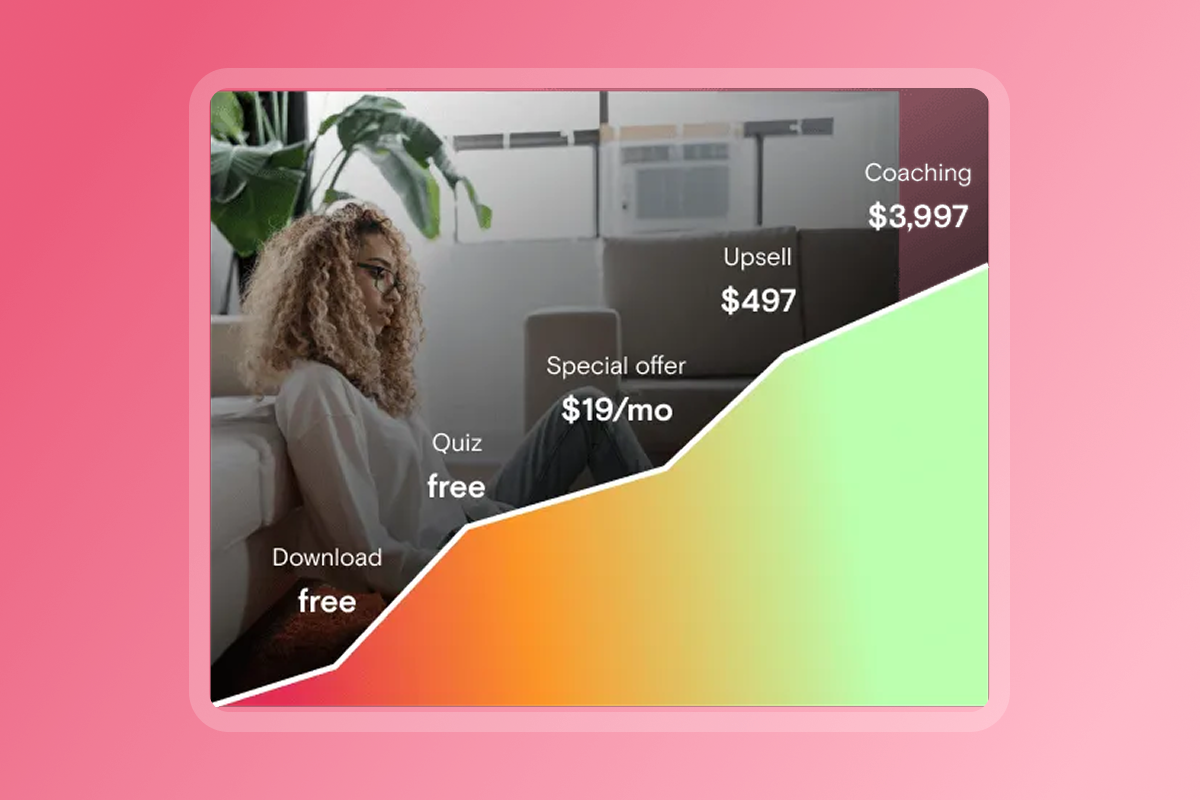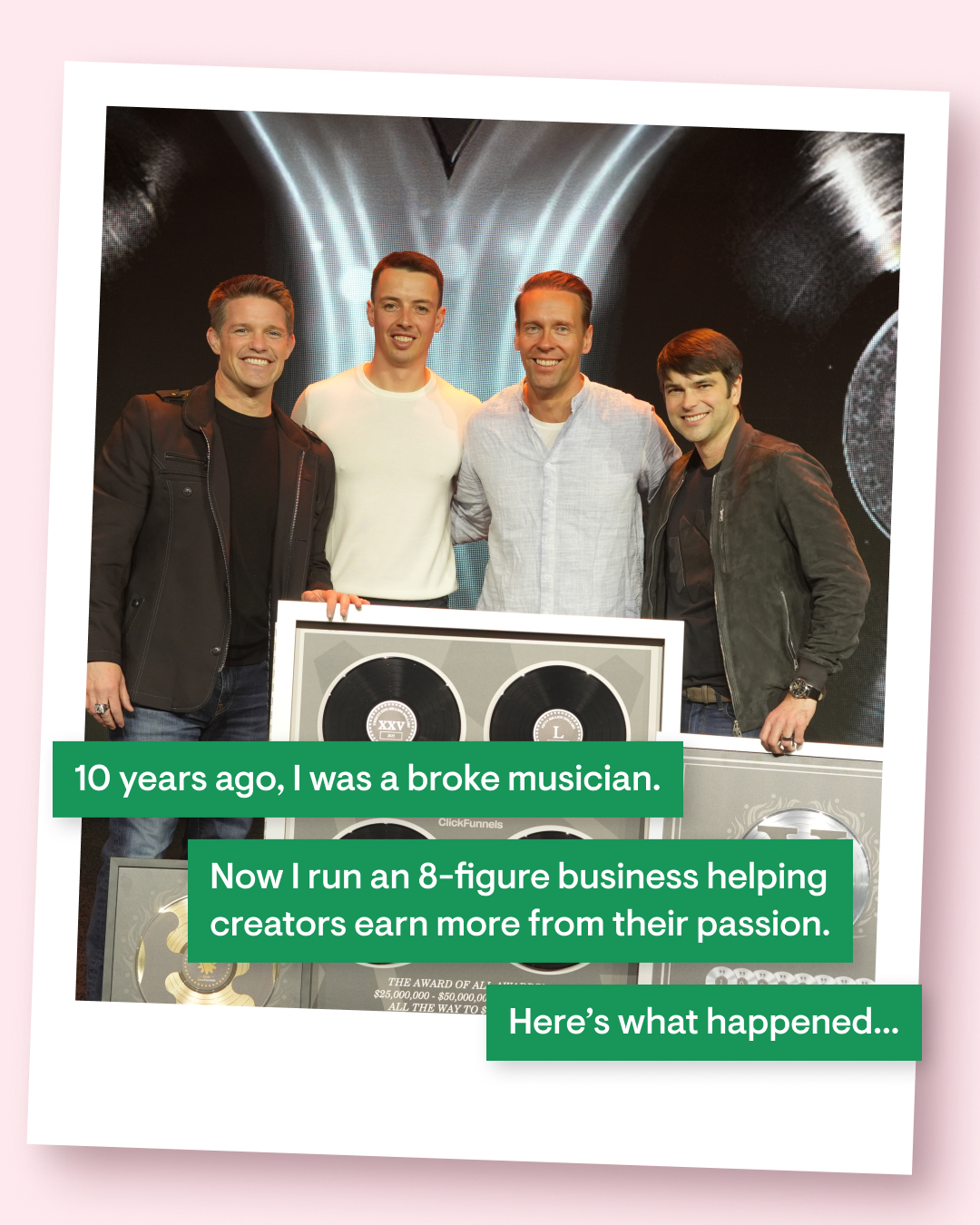Updated 12th November, 2025
When you're generating mid-five-figure MRR, marketplace commissions that eat 37-63% of your revenue become impossible to ignore. Udemy keeps 63% on marketplace sales. Skillshare's royalty pool pays $0.05-$0.10 per minute watched. Meanwhile, you manage seven different tools for content, community, payments, and communication.
For established teachers and coaches, this guide shows the concrete path from marketplace dependency to owned, recurring revenue through a branded mobile and web app.
Why marketplaces limit your teaching business
Third-party marketplaces promise immediate audience access, but that convenience comes with significant long-term costs that established creators quickly outgrow.
The hidden costs of "rented land"
High commission rates eat your profit:
On Udemy, when you drive your own sales through coupons or referral links, you retain 97% of revenue. For sales generated through Udemy's marketplace or ads, your share drops to just 37%. Under Udemy's subscription model, instructor revenue dropped to 17.5% in 2025 and falls further to 15% in 2026 according to Class Central.
Skillshare operates on a royalty pool model, allocating only 20-30% of total membership revenue to teachers, with instructors typically earning $0.05 to $0.10 per minute watched. A 30-minute lesson generates roughly $1.50 to $3.00, split across all views.
When students purchase through iOS or Android apps, Apple and Google take an additional 15-30% before the marketplace's cut.
- Limited brand control and visibility: Marketplaces standardize course pages, limiting your ability to establish a unique brand identity. Your course sits alongside thousands of competitors, often in a price-driven environment where a $100 course regularly sells for $10 during platform-wide promotions you don't control.
- Algorithm risk and dependency: Your reach depends entirely on marketplace algorithms and policies that can change overnight. Teachers face significant anxiety about losing reach due to algorithm or policy changes on platforms they don't control. You're building on land you rent, not own.
- Limited student data access: Marketplaces typically limit your access to student email addresses and detailed behavioral data, making it nearly impossible to build independent email lists, implement personalized marketing, or foster direct relationships. You can't own your audience when someone else controls the relationship, as covered in our complete platform guide.
The typical marketplace trap
Consider the progression: A teacher launches a $100 course on Udemy. Through organic marketplace channels, they earn $37 per sale after Udemy's 63% cut. If students purchase via the mobile app, the net drops further after Apple or Google's fees. Udemy enforces a $25 minimum payout threshold, holding smaller balances until they accumulate.
The teacher has no direct access to student emails, can't offer upsells to premium programs, and watches their course price collapse during platform-wide sales events.
Passion solves these limitations by offering a unified, branded platform where you control pricing, own student data, and keep the majority of your revenue. Watch how creators have successfully made this shift in this Passion app examples walkthrough.
What your own branded app delivers
Moving from a marketplace to your own branded app is a fundamental shift in how you build, engage, and monetize your teaching business.
Full ownership of your audience and brand
Direct customer relationships and data control: When you own your app, you own all the data: personal identifiers, academic records, payment history, and behavioral insights like course progress and activity logs. This granular access lets you personalize learning paths, target marketing precisely, and build CRM systems that drive repeat purchases.
Passion enables you to collect and manage student data directly, giving you the foundation for long-term customer relationships.
"I love my passion app and this community! I appreciate so much the support on the journey to create my own app and my business!" - Trustpilot Review
Consistent brand experience across all touchpoints: A branded app lets you control every detail: logo, colors, fonts, course page layout, and the entire user journey. This consistent brand identity builds trust and differentiates you in a crowded market, increasing perceived value and justifying premium pricing.
Research shows that branded apps enhance perceived value and student trust, making students more likely to complete courses and remain engaged long-term.
Control over content, pricing, and policies: You set the price. You decide when to run promotions. You choose your content delivery schedule. No external platform forces your premium program into a $9.99 sale bucket.
Higher engagement and retention with mobile-first features
Push notifications for direct communication: Push notifications deliver significantly higher engagement rates than email, sending reminders, celebrating milestones, and announcing new content directly to students' lock screens.
Passion's push notification builder lets you schedule automated nudges for trial users, challenge checkpoints, and lesson reminders. Creators using this feature report 15-30% higher completion rates within 90 days, a measurable lift in student success and satisfaction.
In-app community for focused interaction: Unlike Facebook groups you don't control, an in-app community keeps conversations, accountability, and collaboration inside your branded environment. Students can access discussion channels, join challenges, and connect with peers without leaving your app.

SmartWorkout scaled to over 25,500 app users by integrating community features directly into their fitness app, creating a self-sustaining ecosystem that drives renewals.
Offline access for flexible learning: Passion apps allow students to download lessons for offline viewing, making your content accessible during commutes, travel, or anywhere without reliable internet. This flexibility increases completion rates by removing barriers to engagement.
Predictable recurring revenue and flexible monetization
- Subscription models (weekly, monthly, annual): Branded apps let you offer tiered subscriptions that generate predictable monthly recurring revenue. Creators like Savannah Bohlin have grown to 250 subscribers paying $22 per month, while others like Allie Cooper earn $50,000 annually with just 50 subscribers.
- One-time purchases, bundles, and freemium access: Diversify income by offering 21-30 day challenges for $47-$97, high-ticket cohorts for $997-$2,997, and freemium tiers that convert free users into paying subscribers. Passion supports all these models within a single platform.
- Transparent fee structures: Passion charges a 3.9% platform fee on web checkouts via PassionPayments, plus standard Stripe processing fees (typically 2.9% + $0.30). For in-app purchases on iOS and Android, Apple and Google retain 15-30%, but Passion adds 0% on top.
A $100 course sold via Passion's web checkout leaves you with approximately $92.90 after fees. The same course on Udemy sold through organic channels pays you $37. That is a 150% increase in take-home revenue per sale.
Watch this detailed Passion tutorial to see how monetization settings work in practice.
Marketplace vs. branded app: A direct comparison
The table makes the trade-offs clear. Marketplaces offer speed and a built-in audience, but you sacrifice control, branding, and the majority of your revenue.
"Passion makes building your own e-learning app fast, simple, and stress-free. With their no-code, drag-and-drop platform, I was able to design, build, and launch a fully functional app in just a few hours." - G2 Review
How Passion helps you launch your own branded app in weeks
Passion offers a no-code path to launch your branded mobile and web app in weeks, not months. You get courses, community, push notifications, and payments in one platform, plus training and playbooks to help you sell.
No-code app builder for rapid deployment

Drag-and-drop interface and templates: Passion's builder lets you upload videos, PDFs, audio, and text, then arrange them into lessons and sections with zero coding. Add quizzes, timers, goal tracking, drip schedules, and offline downloads as needed. Style with your brand's logo, colors, and fonts.
The web app typically goes live in 2 weeks, with app store submissions underway by Week 3-4. The Expand plan (starting at $599/month) includes app store submission support, reducing your time investment to less than 10 hours total.
Interactive lessons, drip content, and challenges: Build structured learning paths with automated content unlocks based on time elapsed, course completion, or subscription type. This automation lets you launch programs before all content is fully created, ensuring continuous revenue generation.
For a step-by-step walkthrough, watch this Passion beginner's guide.
White-glove support for enterprise creators (Plus plan)
The Passion Plus plan offers custom, done-for-you build and launch services with minimal founder time required. Plus includes app store submission support, content migration from existing platforms, and a named success manager. You focus on your content and marketing while Passion handles the app plumbing: hosting, updates, and store approvals.
Plus customers receive direct access to a dedicated success manager with defined SLAs, plus growth coaching to optimize monetization strategies, engagement funnels, and retention tactics.

"Passion team always answers my emails and questions. Running an app as a computer illiterate creator isn't easy but passion makes it simple!" - Trustpilot Review
Integrated monetization and engagement tools
PassionPayments for web checkout: PassionPayments charges a 3.9% platform fee, plus Stripe's standard processing fees. This is significantly lower than marketplace commissions, allowing you to retain the majority of your revenue on high-ticket and annual subscription sales.

In-app purchases (Apple/Google 15-30%): For mobile convenience, offer in-app purchases. Apple and Google retain 15-30% depending on their Small Business Program eligibility, but Passion adds 0% on top. Route bundles and premium programs to web checkout to maximize margin, and use IAP for convenience upsells.
Push notifications and in-app community: These features integrate within Passion, creating a unified experience. Push notifications drive logins, in-app community fosters accountability, and offline access removes friction. Together, they create engagement loops that drive completion.
Learn how to automate workflows with Passion and Zapier in this automation tutorial.
Real results: Creators who own their apps
Case studies: Six-figure months and high engagement
Savannah Bohlin (The Portal App): Savannah Bohlin transitioned from a web-first platform to a branded Passion app, growing to 250 subscribers at $22.22 per month, generating $66,000 in annual recurring revenue. Her holistic wellness content demonstrates how a focused, premium-priced subscription model drives predictable income. She uses interactive live classes and push notifications to maintain high engagement and retention.
SmartWorkout: SmartWorkout leveraged a branded app to generate over €163,000 in annual revenue from a €5 app subscription, while also achieving a 72% upsell rate when the app was bundled with resistance band purchases. This showcases the power of product-app integration and diversified monetization. With over 25,500 users across English and French apps, SmartWorkout proves that low-cost subscriptions at scale can drive substantial revenue.
Similar results appear across niches: Tiffany Wilkerson generates over $60K annually in business coaching, while Bakerlou Music achieved $4,100 monthly with just 20 subscribers. These creators share a common strategy: they shifted from launch spikes to stable MRR using push notifications and in-app challenges to drive 10-20% MRR growth within 90-180 days.
For more creator success stories, explore Passion case studies.
Take control of your digital education business
Established creators like you already have the audience and revenue. You need infrastructure that consolidates tools, protects your reach, and scales with your vision. Passion provides that infrastructure with no-code builders, transparent fees, and white-glove support. Your app can be live in weeks, not months.
You stop giving 37-63% to third parties and building on platforms that can change policies overnight. You start owning customer relationships, data, and the entire experience through push notifications, in-app community, and flexible monetization.
See how top creators launch in 4-8 weeks with white-glove support: Book a demo to explore our Plus offering and discuss your specific needs.
Launch risk-free: Our no-code builders come with a 30-day money-back guarantee, so you can start building your app with confidence.
Download the 30-day app launch checklist: Grab our app launch blueprint with proven timelines and milestones.
FAQs
How much does Passion charge on web sales?
Passion charges a 3.9% platform fee on web checkouts via PassionPayments, plus Stripe's standard processing fees (typically 2.9% + $0.30 per transaction).
Can I offer subscriptions and one-time purchases in the same app?
Yes, Passion supports tiered subscriptions, one-time purchases, freemium access, and bundles within a single app, allowing you to diversify revenue streams.
Do I own my student data on Passion?
Yes, you own all student data, including personal identifiers, academic records, payment history, and behavioral analytics like course progress and activity logs.
What is Udemy's instructor revenue share for subscription sales?
Under Udemy's subscription model, instructor revenue share dropped to 17.5% in 2025 and falls further to 15% in 2026, significantly lower than direct sales.
Key terms glossary
PassionPayments: Passion's built-in payment gateway for web checkouts, charging a 3.9% platform fee plus Stripe processing fees. Enables you to retain more revenue than marketplace models.
In-app purchases (IAP): Purchases made directly within iOS or Android apps, where Apple and Google retain 15-30% of the transaction. Passion adds 0% on top.
Monthly recurring revenue (MRR): Predictable revenue generated each month from active subscriptions. A key metric for sustainable business growth and investor valuation.
Push notifications: Direct messages sent to a user's mobile device, driving engagement rates significantly higher than email. Critical for lesson reminders and retention.
Tool sprawl: The operational drag created by managing multiple disconnected platforms for content, community, payments, and communication. Branded apps consolidate these into one hub.














